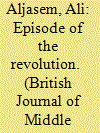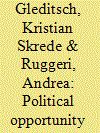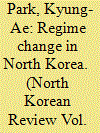|
|
|
Sort Order |
|
|
|
Items / Page
|
|
|
|
|
|
|
| Srl | Item |
| 1 |
ID:
186072


|
|
|
|
|
| Summary/Abstract |
Political Opportunity Structure (POS) theorists have paid attention to either the structural factors or to the agential ones while studying social movements. Through the nexus of structure and agency this article explains the collective action of the students of Aleppo University between 2011 and 2013 as one episode of the Syrian Revolution. I argue that structures alone are not enough to facilitate collective action. It is the agency of the social movement participants that mend the structures to open more opportunities. Through applying Tilly and Tarrow’s properties of a regime to the Syrian case I explore the opportunities that the challengers took to advance their claims to sustain their movement for three years. I argue, however, that the properties of the Syrian regime were not equally significant. By capitalising on their agency, I highlight the everyday micro practices of the students in challenging the regimes inside the campus. Finally, I look at the prominence of some properties over others and empirically show how these regime properties eventually led to the end of the movement inside the campus in 2013.
|
|
|
|
|
|
|
|
|
|
|
|
|
|
|
|
| 2 |
ID:
146324


|
|
|
|
|
| Summary/Abstract |
The Maidan protests provide us with insights into Ukrainian society and the dynamics of mobilisation more generally. Based on the EuroMaidan Protest Participant Survey, on-site rapid interviews with protesters, interviews with politicians, activists and journalists, and focus groups with ordinary citizens and activists, this essay maps the actors, claims and frames of each phase in the protest cycle. It highlights the diversity of actors and the inability of activists and party leaders to coordinate as the central features of the protests. Our analysis reveals the fluid and contingent nature of cleavages commonly portrayed as fixed and politically salient.
|
|
|
|
|
|
|
|
|
|
|
|
|
|
|
|
| 3 |
ID:
097768


|
|
|
|
|
| Publication |
2010.
|
| Summary/Abstract |
Theories of mobilization suggest that groups are more likely to resort to violence in the presence of political opportunity structures that afford greater prospects for extracting concessions from the government or better opportunities to topple ruling governments. However, existing efforts to consider the possible influences of political opportunity structures on incentives for violence and civil war empirically have almost invariably relied upon measures of democracy to proxy for the hypothesized mechanisms, most notably the argument that the opposing effects of political accommodation and repression will give rise to an inverted U-shaped relationship between democracy and the risk of civil war. The authors detail a number of problems with measures of democracy as proxies for political opportunity structures and develop alternative measures based on the likely risks that political leaders will lose power in irregular challenges and their implications for the incentives for resort to violence. The authors evaluate empirically how the security with which leaders hold office influences the prospects of violent civil conflict. The findings indicate that recent irregular leader entry and transitions indeed increase the risk of conflict onset, while democratic institutions are found to decrease the risk of civil war, after controlling for the new measures of state weakness.
|
|
|
|
|
|
|
|
|
|
|
|
|
|
|
|
| 4 |
ID:
090092


|
|
|
|
|
| Publication |
2009.
|
| Summary/Abstract |
The structuralist perspective of regime change looks at economic constraints as the principal explanatory variable of regime collapse, suggesting that both economic crisis and economic reform give rise to political pluralism, activate civil society, and thus lead to regime change. The Kim Jong Il regime in North Korea escaped its collapse in spite of the prolonged economic crisis. The article offers an analysis of North Korean exceptionalism in regard to the economic crisis and economic development theories of regime change. It argues that several components of political opportunity structures salient to North Korea work as constraints of regime change, and offers an assessment of prospects for activation of North Korea's civil society. An earlier version of this article was published as "Regime Change in North Korea?," in T. Roehrig, J. Seo, and U. Heo, eds., Korean Security in a Changing East Asia (New York, NY: Praeger, 2007), pp 70-92.
|
|
|
|
|
|
|
|
|
|
|
|
|
|
|
|
|
|
|
|
|